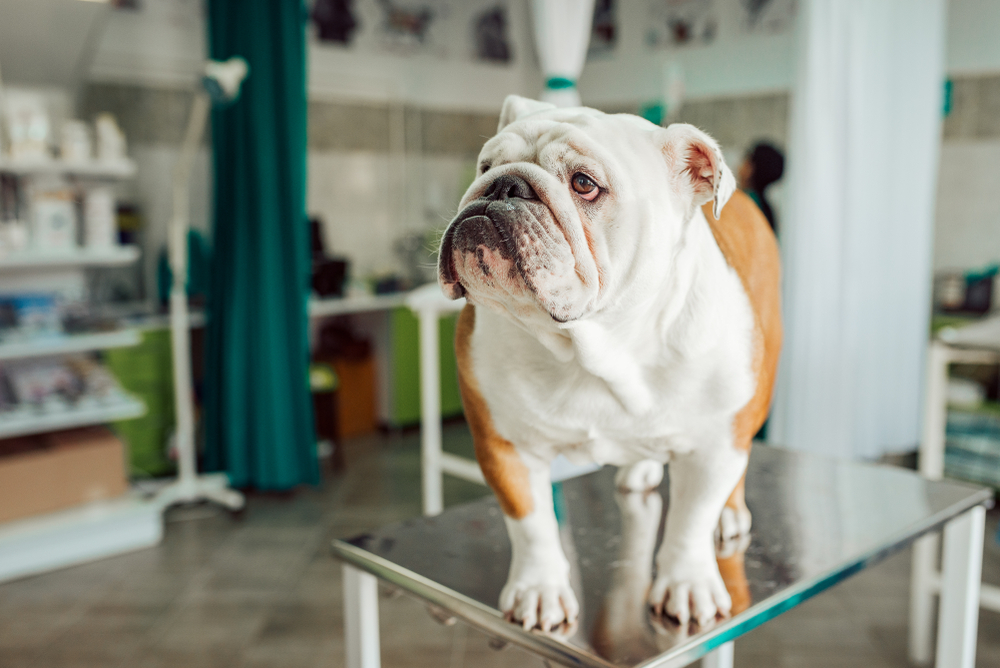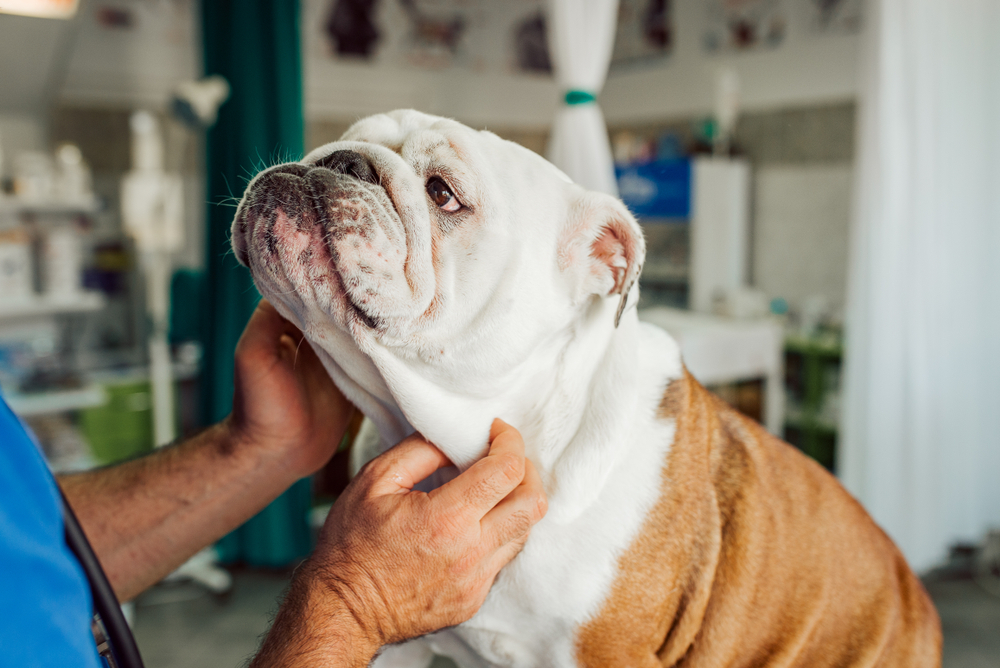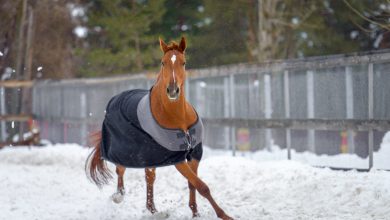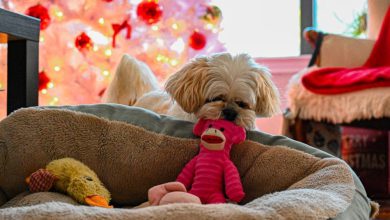Bulldog Tail Pocket Infection: Vet-Approved Prevention & Care Guide

As a Bulldog owner, you know there are some non-negotiable parts of your grooming regimen. For example, your pup’s facial wrinkles are part of what makes them so adorable, but they can also be very time-consuming to clean. But did you know that there’s another non-negotiable part of Bulldog grooming that you might be overlooking?
Tail pockets are skin folds around the base of a dog’s tail. These pockets, like your pup’s facial wrinkles, can accumulate moisture, dirt and debris and become a breeding ground for bacteria and yeasts. It needs to be part of your regular grooming regimen to prevent infections. Read on to learn more about tail pocket infections, including how to care for and prevent them.

What Is Bulldog Tail Pocket Infection?
Also known as a tail fold, a tail pocket is a pouch-like area or skin fold found above or below a dog’s tail. The presence of a tail pocket mostly depends on the tail structure and genetics, they are common in breeds with shorter tails and wrinkles. English and French Bulldogs are particularly prone to developing tail pockets due to their short and often tightly-curled corkscrew tails.
Tail pockets are not always easily visible, some Bulldogs may have shallow or hidden tail folds that are not obvious. To check to see if your pup has a tail pocket, put on a pair of gloves and gently push your finger around the base of the tail. If there’s a gap or you see an indentation, that’s a tail pocket!
Tail pockets don’t always cause issues, but they can be quite bothersome and irritating for your pup when they do. Infections can occur as the pocket’s indent holds onto moisture, causing dirt and debris to build up, and bacteria and yeast to overgrow.
What Are the Signs of Bulldog Tail Pocket Infection?
The signs of a tail pocket infection in Bulldogs include:
- Dry, flaky, or itchy skin around the tail
- Irritated skin around the tail
- Foul odor
- Discharge in the tail pocket
- Discomfort
- Pain
What Are the Causes of Bulldog Tail Pocket Infection?
Think of your pup’s tail pocket as your belly button. You know how nasty yours can smell if it’s not cleaned, especially deep belly buttons. The same can apply to your Bulldog’s tail pocket.
The skin fold creates a warm and moist environment in the tail pocket making it the perfect environment for bacteria and yeast to flourish and multiply leading to infections.
Tail pockets aren’t usually a cause for concern so long as they’re kept clean. However, as soon as dirt, debris, and moisture are allowed to build up, inflammation and infections can occur. Your pup may develop bacterial or yeast infections.


How Do I Care for a Bulldog With a Tail Pocket Infection?
See Your Vet
If you suspect your dog has a tail pocket infection, check in with your veterinary team before treating it at home. Your vet knows your dog best and can make personalized recommendations for addressing the issue at hand.
Your veterinarian will begin by cleaning your Bulldog’s tail pocket area and may also prescribe antibiotics or topical medications to keep your pup comfortable and prevent the infection from worsening. They may take a sample of the discharge to look at under the microscope and identify the type of infection. In more severe infections they may also send swabs off to a laboratory for fungal and bacterial culture.
Perform At-Home Care
Once you’ve seen your vet, you can try several things at home to address your pup’s tail pocket issues, but only do so under the supervision of your veterinary team.
Get to know the curvatures and depth of the skin folds around your dog’s tail to make sure you can keep it clean in the future. Remember if infection is present it may be quite sensitive.
Remove any dirt and debris from the pocket using safe, natural, dog-friendly wipes. Your vet may recommend medicated wipes, for example those that contain antiseptic ingredients such as chlorhexidine. Ask your vet for advice on the best product to use to keep the tail fold clean. Once the area is clean, be sure to dry it thoroughly; otherwise, moisture can get trapped and create more problems. Use a fresh cloth or cotton ball to gently pat the pocket area until it’s fully dry.
If your vet recommends it, you can apply a soothing balm or spray to prevent infection or irritation.
You should not pop any blisters or pus-filled bumps your Bulldog may have developed near the infected area. This can cause further irritation and make the infection worse.
Hydrogen peroxide is sometimes used to clean wounds, but this practice is actually quite dangerous. It can harm and irritate the tissue and delay the healing process, so leave the hydrogen peroxide in your medicine cabinet for now.

Frequently Asked Questions (FAQ)
Do other breeds get tail pocket infections?
Many short-tailed breeds have tail pockets, so while this condition is most seen in bulldog breeds, any pup with wrinkly skin can develop it. Some of the most common non-bulldog breeds that get tail pocket infections are Pugs and Shar-Peis.
How can I prevent tail pocket infections?
Wrinkles are a Bulldog’s trademark. The ones on their face and body are easily visible, which means there’s always a visual reminder that your pup needs their wrinkles cleaned. However, the tail pocket is not always visible, and because it’s located in an area of the body that doesn’t require much grooming or attention, it’s easy to forget about. But that shouldn’t be an excuse for completely forgoing this essential piece of your Bulldog’s grooming regimen.
Tail pocket infections can usually be prevented by being proactive and ensuring your Bulldog’s tail pocket is cleaned regularly. After cleaning the area, ensure it’s fully dry before letting your pup go.
What if my Bulldog’s tail pocket infection keeps coming back?
Some Bulldogs may have extremely deep tail pocket indents that make keeping them clean and infection-free nearly impossible. In these situations, your veterinary team may recommend surgical correction with full or partial tail amputation. They’ll discuss with you the pros and cons of such a procedure and what you should expect afterward as it pertains to your pup’s hygiene. Surgical removal of the tail folds can permanently alleviate the discomfort your Bulldog experiences due to their deep tail pocket.

Conclusion
A tail pocket infection occurs in some wrinkly, short-tailed dog breeds and is especially common in Bulldogs. These infections happen when bacteria or yeast overgrow in the warm, moist environment that the tail pocket creates.
In most situations, tail pocket infections can be avoided with preventative care. However, some pups can have very deep pockets that cause recurring infections, extreme discomfort, and constant issues. If this is the case with your Bulldog, your veterinary team may suggest surgical correction.
Featured Image Credit: Branislav Nenin, Shutterstock



